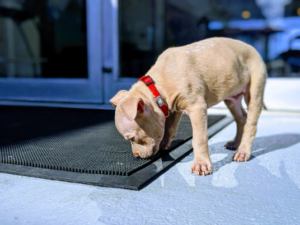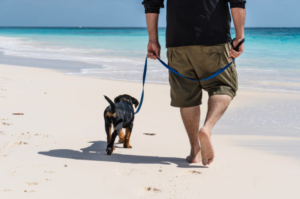Hip dysplasia is an orthopedic developmental disorder of puppies affecting the joints of the buttocks. The joints at a puppy’s hips are typically conformed at a ball and socket style, where both components fit snugly and nicely into each other. Fundamentally, in a puppy influenced by hip dysplasia, due to structural flaws, the femur’s head doesn’t work correctly in the socket, providing the increase to looseness in the joint and, over time, cartilage injury.
Therefore, affected puppies will create crippling arthritis that tends to be innovative. Large breed dogs are especially susceptible to hip dysplasia. Normally, dogs badly affected by the disorder will reveal the orthopedic ailment symptoms in their first life period. The canine hip dysplasia is one of the things you need to be aware of when you are a dog owner.
Causes of Hip Dysplasia
 Frequently pet owners are surprised to find out their dog has grown hip dysplasia. Many never heard about this ailment before. This ailing condition is hereditary, meaning it may be passed from the production of puppies to another. A fantastic way to up the likeliness of buying a dog not affected by this ailment will be to rely upon a respectable breeder that OFA assesses the puppy’s parents, and it has done so for generations. PennHIP is just another organization that evaluates hips and supplies scores. Dogs such as Borderline, Mild, Moderate, and Severe scores shouldn’t be bored. Regrettably, backyard breeders typically don’t health test their breeding pool to get hip dysplasia producing a large selection of dogs with orthopedic issues. It’s crucial to consider that sometimes, the top litters can yield dogs using hip dysplasia. There are instances where generations of breeding have afforded puppies with no hip dysplasia and then 1 day out of the blue.
Frequently pet owners are surprised to find out their dog has grown hip dysplasia. Many never heard about this ailment before. This ailing condition is hereditary, meaning it may be passed from the production of puppies to another. A fantastic way to up the likeliness of buying a dog not affected by this ailment will be to rely upon a respectable breeder that OFA assesses the puppy’s parents, and it has done so for generations. PennHIP is just another organization that evaluates hips and supplies scores. Dogs such as Borderline, Mild, Moderate, and Severe scores shouldn’t be bored. Regrettably, backyard breeders typically don’t health test their breeding pool to get hip dysplasia producing a large selection of dogs with orthopedic issues. It’s crucial to consider that sometimes, the top litters can yield dogs using hip dysplasia. There are instances where generations of breeding have afforded puppies with no hip dysplasia and then 1 day out of the blue.
Treatments for Hip Dysplasia
 On the other hand, for puppies, a weight reduction regimen can work wonders because every additional pound plays a part in placing strain on the buttocks. Being a little on the slender side may work wonders. Avoid eating high energy diets from large breed dogs that you ought to avoid strenuous exercise, so moderation is essential. Swimming is a superb game your dog will appreciate and will help keep decent muscle mass and tone. Your veterinarian might also prescribe nonsteroidal anti-inflammatory drugs; however, you must know about possible side effects. Never provide over the counter drugs like Tylenol or Ibuprofen; these are poisonous in dogs. Aspirin might be awarded short term, after the vet’s information and observation for gut issues. The vet may recommend surgery based on the amount of seriousness of hip dysplasia. Triple pelvic osteotomy is a choice before arthritis has been put in. The total hip replacement could be a successful operation when performed by highly skilled vets at referral clinics. Another option is a femoral head ostectomy and DARthroplasty that’s a still rather new process.
On the other hand, for puppies, a weight reduction regimen can work wonders because every additional pound plays a part in placing strain on the buttocks. Being a little on the slender side may work wonders. Avoid eating high energy diets from large breed dogs that you ought to avoid strenuous exercise, so moderation is essential. Swimming is a superb game your dog will appreciate and will help keep decent muscle mass and tone. Your veterinarian might also prescribe nonsteroidal anti-inflammatory drugs; however, you must know about possible side effects. Never provide over the counter drugs like Tylenol or Ibuprofen; these are poisonous in dogs. Aspirin might be awarded short term, after the vet’s information and observation for gut issues. The vet may recommend surgery based on the amount of seriousness of hip dysplasia. Triple pelvic osteotomy is a choice before arthritis has been put in. The total hip replacement could be a successful operation when performed by highly skilled vets at referral clinics. Another option is a femoral head ostectomy and DARthroplasty that’s a still rather new process.

